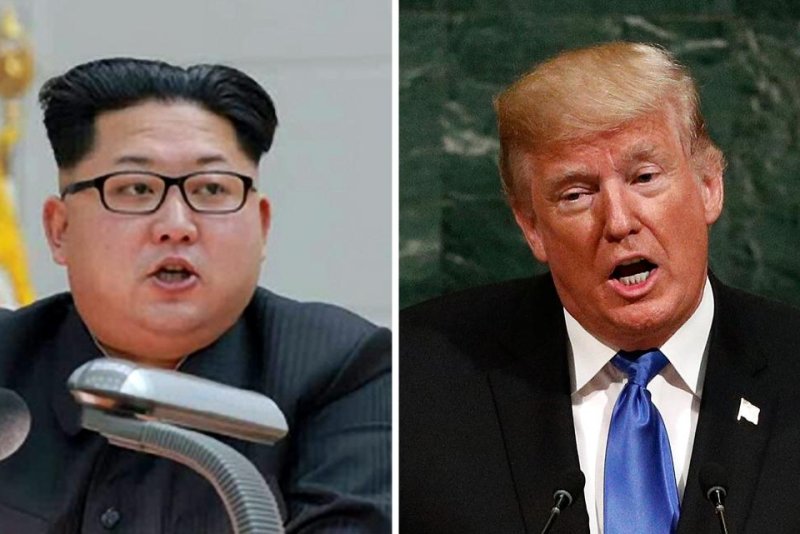North Korea’s Kim Jong Un and U.S. President Donald Trump must meet in order to end the cycle of provocations, a U.S. analyst says. File Photo by EPA-EFE/KCNA
NEW YORK, Oct. 13 (UPI) -- U.S. President Donald Trump must talk with Kim Jong Un in order to deliver a major breakthrough in the nuclear crisis on the peninsula, a U.S. analyst said.
Charles Armstrong, a professor of Korean studies at Columbia University, said the two leaders must meet because of the way the regime in Pyongyang functions and responds to crises.
"In the case of North Korea in particular, powerful changes must come from the highest level, from the supreme leader," Armstrong said at a talk at New York's All Souls Church on Thursday. "Trump has to talk to Kim Jong Un."
Armstrong, who has studied the relatively isolated state for decades, also described NBA Hall of Famer Dennis Rodman's most recent North Korea visit, in April, as a positive development.
"Kim and Trump have one friend in common, that's Dennis Rodman," the analyst said. "Rodman, when he last visited North Korea, he brought a copy of the Art of the Deal to bring to Kim Jong Un.
"If Kim reads it, he would be curious to learn more, and maybe even talk to the so-called author of that book."
Trump is scheduled to travel to Asia, including a stop in South Korea, Nov. 3-14.
In the course of his presidential campaign in 2016, Trump had said he would be willing to sit down with Kim for a hamburger.
That meal may be tempting to accept for Kim as North Korea may be, at least momentarily, rethinking how much it wants to provoke the United States.
Pyongyang kept quiet on the 72nd anniversary of the founding of the Korean Workers' Party, defying expectations of another weapons test this week.
But more importantly, the North Korean leader may be in a tough bind.
"He's gotten into a situation where he can't give up" the nuclear weapons, Armstrong told UPI. "He's made them a major symbol of North Korean security. They're not to be bargained away, at this point. Maybe sometime down the line they can be."
The analyst said that despite the presence of "two heavily armed, mutually hostile governments" on the peninsula there have been breakthroughs, and particularly at the peak of crises.
"Maybe this is another crisis that can be turned into an opportunity," Armstrong said, referring to the current escalation of tensions. "Every time war seemed imminent [the United States and North Korea] came to an agreement."
That cycle of tensions and de-escalation dates back to 1968, when the North Koreans captured the U.S. intelligence ship, the USS Pueblo, Armstrong said.
The capture of the ship, followed by the 1969 EC-121 shoot-down incident, when a North Korean MiG-21 aircraft shot down a U.S. Navy aircraft on a spy mission, raised hostilities at the time.
But the United States decided not to escalate the war during a period of geopolitical change and "rapprochement between the United States and China," Armstrong said.
Other cycles have followed since, but the nuclear crisis has escalated since the death of Kim Jong Il.
"There's been unprecedented acceleration of nuclear and missile tests in North Korea, to which the U.N. has responded with increasing sanctions," Armstrong said, referring to the leadership of Kim Jong Un. "But brutal sanctions have not deterred North Korea so far."
The analyst said North Korea's call for an end to "U.S. hostile policy" is not clearly defined, but added what the North Koreans "really want is to be recognized, to be taken seriously, to not be belittled and to be in an environment that is more secure."
"Their goal certainly is not to destroy the United States."
Trump's recent remarks at the United Nations General Assembly, to "totally destroy" North Korea if it attacks, have also raised concerns among Korean Americans in New York.
Minsun Kim, president of the Korean American Association of Greater New York, said Thursday "military action must be avoided at all costs."
"The two Koreas must reach an agreement using mutual respect," Kim said. "The United States, China, Japan and Russia must seek a peaceful solution."
Armstrong said South Korea, "wants to be listened to," referring to recent developments in Washington-Seoul ties.
"It just amazes me that the people who have the most to lose in a real conflict, who are America's allies, are not being taken very seriously by the current administration," Armstrong said. "The very day Donald Trump made one of his threatening remarks about North Korea, he at the same time called the South Korean president to scrap the [U.S.-South Korea] free trade agreement."
"It's not a very kind way to treat an ally who is facing such a serious threat."















